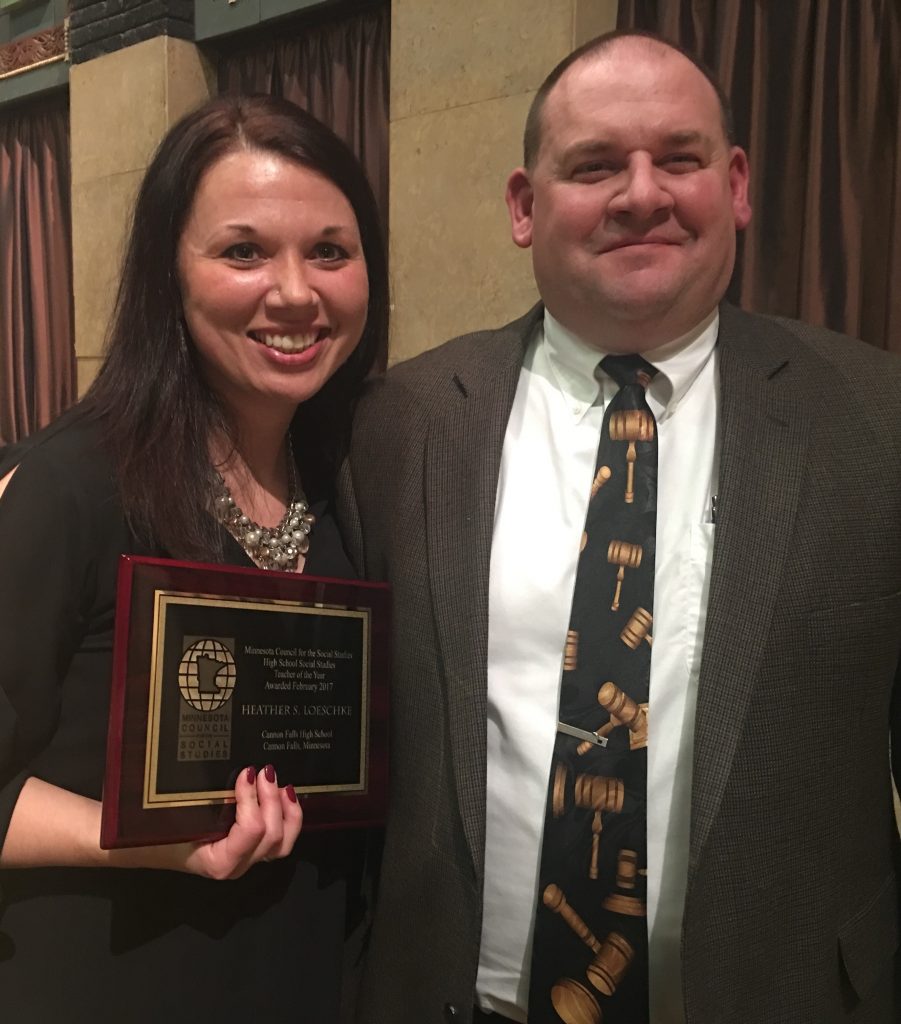Ashbrook Teacher and MAHG Student Named 2017 Minnesota Teacher of the Year
December 24, 2020

In March, the Minnesota Council of Social Studies named Heather Loeschke its 2017 Teacher of the Year. Loeschke, a 2014 graduate of Ashbrook’s Master of Arts in American History and Government (MAHG) program, has taught for 21 years—since 2001 at Cannon Falls Junior/Senior High School, a rural school 35 miles south of the Twin Cities. For many years a government teacher, she now also covers Advanced Placement US history (APUSH). We asked her about her teaching goals and how Ashbrook programs supported them.
Why did you enroll in the MAHG program?
I was a history major in college. Then for many years I taught civics, developing a profound love of that subject—but I needed more content knowledge, especially in history. I would be picking up the APUSH course at my high school when a colleague retired. You can’t fool a kid. If you don’t know the content, they know that you don’t know it, and you lose their attention and focus. Pedagogy is important, but that’s mostly smoke, bells and whistles.

How did the MAHG program support your teaching?
Every single class I took in Ashbrook’s program has benefitted me in some way. The broad course offerings allowed me to choose classes related to the areas I teach. I use documents we read in MAHG in APUSH, in government classes, and to help kids prepare for “We the People” (a national civics competition).
People ask me, is MAHG a degree in history or a degree in government? I say, it’s a degree in both, with a foundation in Constitutional studies.
This spring at our state’s social studies council meeting, I sat on a panel with former recipients of the teacher awards. We spoke to a standing-room only crowd about our philosophies as educators and about our teaching approaches. Then teachers asked us, “What makes you an excellent teacher?” All the other awardees talked about their lesson plans. I spoke of my continuing education. Each summer I attend seminars and conferences. Through Ashbrook and other opportunities, I’ve visited historic places, met several Supreme Court justices, visited the White House, talked with Senators and been on the House floor, and visited the Pentagon. I’ve met some extraordinary people. I told teachers to sign up for Ashbrook’s weekend seminars. “You’ll read and discuss primary documents with extraordinary professors. You’ll network with other great teachers and see historic places. It will have a profound impact on your teaching.”
Do you need to know American history in order to understand US government?
Yes—and the reverse is also true. A teacher told me, “When I get kids in AP US Government, they have never in their entire lives taken a government class.” Most students in her district leave high school without any civics instruction. Her district assumes students get government content in their history classes. Well, perhaps—if the teacher is well versed in both. We do kids a disservice if we don’t require both history and government. Many problems in politics today arise because voters have never read the Constitution or learned American history. Citizens argue the Electoral College should be abolished, not knowing why the Founders created it; or they don’t see that our system of checks and balances is being eroded, as Congress fails to use its Constitutional powers to keep the executive branch in check.
What do your students need to learn in order to become participating citizens in our democratic republic?
How government works and how it affects them. I tell students, “Government will affect your life whether you learn about it or not. But whether it is a positive or negative impact is entirely up to you. If you don’t know the right questions or whom to ask, the wheels of government will roll right over you.” In class, I refer to the words of statesmen I read in Ashbrook’s program. I quote Madison, who said in Federalist 51 that the Constitutional provisions for checks and balances can only go so far; ultimately, “Our dependence is upon the people.” Citizens must thoughtfully exercise their right to vote.

